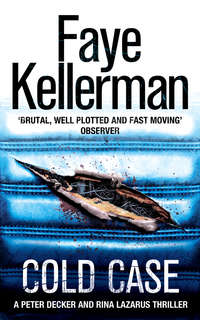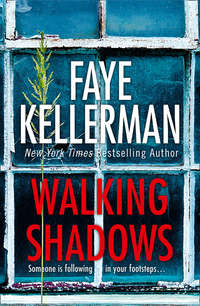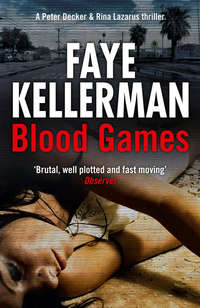
Полная версия
Sanctuary
Orit didn’t answer.
Decker said, “You’re going to have to trust someone, Orit, if you want to get to the bottom of this.”
“You think something’s wrong, don’t you?”
“We’re a little concerned,” Marge said.
Orit shrugged. “On my dresser. If I want to hide it I don’t put it in my safe.”
“So you do have a safe,” Marge said.
“Yes, but only for the robbers.”
Decker and Marge looked at each other.
“They know you’re in diamonds, you have to give them something if they break in. Otherwise, they get mad. But you don’t keep the good stuff there … only junk.”
Again, Marge and Decker traded glances.
“I learned that from my father, too,” Orit said.
“What else did you learn from Dad?”
Orit hesitated, then spoke in a burst. “Before my father got a vault at the diamond center in Tel Aviv, he had to keep lots of loose stones at home. He used to hide them in the toilet.”
Marge said, “We checked.”
“You did?” Orit was shocked.
“Drug dealers keep their goods in the water tank,” Decker explained. “We also checked the freezer—another common spot. Nothing. Any other suggestions?”
Orit stared at them, then shook her head no.
Marge looked around. “If I were diamonds, where would I be?”
Decker tapped his foot. Again his eyes went back to the mezuzah. Being new to the Jewish religion, Decker realized, was why it had taken him so long to see what was wrong. Outside-door mezuzahs were supposed to be posted on the outside of the doorframe. This one was on the inside. Maybe because it was so fancy, they didn’t want it sullied.
But then again.
Decker slipped on a latex glove. “Detective Dunn, could you get me a screwdriver from the trunk of the car?”
“You got it, Sarge.”
“What you’re going to do?” Orit asked.
“You stick around,” Decker answered. “I want a family witness here in case we find the mother lode.”
“What do you mean—mother lode?”
“Cash, money … possibly diamonds.” Decker pointed to the mezuzah. “There.”
“What?” Orit said. “You’re crazy. That’s a religious article.”
“I know what a mezuzah is, Ms. Bar Lulu. I also know where they are supposed to be posted. Beytecha oovesha’arecha—your houses and gates—on the outside.”
Orit stared at him. “You speak Hebrew?”
“No, but I know the Sh’ma.”
“I knew I liked you.”
Marge came back in and handed Decker the screwdriver. Carefully, he unwound the top and bottom screws that affixed the scroll holder to the wall. They came out more easily than he had expected. He peered inside the hollow rut of the silver casing.
Empty—where was the parchment that contained the holy prayer?
Was there ever a parchment?
He showed the empty holder to Orit. “Can I bag this for evidence?”
“Evidence of what?” Orit asked.
“I want to have this dusted for prints.”
“You think Arik kept money there?”
Marge asked, “What do you think, Ms. Bar Lulu?”
“I think it’s funny the Sh’ma’s not there, yes. But Arik is not a religious man.”
“So why put up a mezuzah period?”
“Maybe for the boys.” Orit waved her hand. “Yes, take it for evidence. As long as it comes back.”
“Ms. Bar Lulu,” Decker said, “does your sister-in-law have a maid?”
“Not now. Dalia had wonderful help for six years. Amelia went back to El Salvador a month ago. Dalia is still looking. She is very particular who is in her house.”
“So who’s been cleaning the house?” Marge asked.
“My lady, Bonita, helps Dalia once a week. Not much to do except laundry. The boys do their own rooms. Bonita was going to come tomorrow. What do I tell her?”
Marge said, “Tell her to hold off until we find out where the family is.”
“That’s what I think, too.”
Decker said, “Do you know anything about the porcelain dogs in the front entry hall?”
“Dogs? What dogs?”
Guess that answered that, Decker thought.
“You want to take dogs, too?”
Decker shook his head. “Just the mezuzah. I’ll need you to sign something that states we have your permission to take it,” Decker said. “Make sure that everyone’s satisfied that we did this by the book.”
“By the book?” Orit asked.
“That we acted kosher,” Decker said.
“Ah, that I understand.”
5
Sitting at the conference-sized dining table, Decker felt like a movie mogul. The tabletop was a slab of pink marble swirled with white and blue—no doubt some custom job out of an exotic quarry. Orit Bar Lulu was at his right; Marge sat across the rose-colored sea. Orit seemed scared. Their prolonged presence had justified her suspicions and that was not good news. Decker placed his notebook on the stone, wondering if he could write without scratching the surface. He gave Marge the go-ahead.
“I’d like to ask you a few questions, Ms. Bar Lulu,” Marge said.
“Of course. Why else am I here?”
Marge cleared her throat. “When was the last time you saw or heard from your brother?”
“Two days ago.” Orit sighed. “We had lunch together—Arik came to the office—the real estate office where Dalia and I work.”
“The name?”
“Manor One Realty.”
Marge wrote it down. “Anything special happen at lunch?”
“Not a thing. Everything was regular.”
“They didn’t seem nervous? Excited maybe?”
“I saw nothing. Of course, I wasn’t looking for something wrong, you know?”
Marge nodded. “Then what happened?”
“What happened?” Orit shrugged. “Nothing happened. We ate lunch, talked about the kids. Then Arik and Dalia left.”
“Together?”
“Yes. It was close to quitting time so she left with him. The next day Dalia didn’t come to work. I didn’t think anything about it. Real estate agents work from their homes all the time. So maybe she took the morning off. I called her in the afternoon to ask her to pick up Sharoni. No answer. I called two, three times maybe. No machine, nothing. I thought that was strange so I called my brother at work. His partner told me he didn’t show up today—no explanation, nothing. Shaul was mad, I could tell. I didn’t want to get Arik in trouble, so I made excuses.”
“What kind of excuses,” Marge said.
“Oh, the usual. Something came up … ehhhh, he must have something important to do. Shaul didn’t like my excuses. He’s very hard on Arik, but that’s not new.”
“What do you mean, ‘Shaul’s hard on Arik’?” Decker asked as he wrote.
“They’re partners. But they are very different—fire and water.”
Marge caught Decker’s eye. They’d go over that one later.
Orit didn’t seem to notice. “But just like life needs fire and water, they needed each other. So what if they don’t get along?”
“They fought publicly?” Marge asked casually. “Or was it more like a cold war.”
“Both.”
“What’s the problem?”
Orit appeared to be thinking. “Shaul’s … slow, not slow, but …”
“Deliberate?” Decker tried.
“Exactly. Shaul’s deliberate. Arik has creativity—all the ideas. Some work, some don’t. The boys are a perfect mix for business, but they get on each other’s nerves. Shaul’s always mad at Arik for being careless. Arik’s always mad at Shaul for slowing him down. But they don’t give up on each other. They’re too smart for that.”
Decker didn’t know if it was a language problem, but Orit’s choice of words seemed telling. “What do you mean by Arik being careless?”
Orit said, “What do I mean?”
Marge picked up on Decker’s drift. “Is Arik careless with Shaul’s money?”
Orit shook her head. “I don’t mean careless. It’s a difference in personality. Arik wants to go, go, go. Shaul says, ‘Now, wait a minute.’”
“Does Shaul have a last name?” Decker asked.
“Gold. Shaul Gold.”
“He didn’t know where Arik was?”
“No,” Orit said. “He was angry that Arik didn’t come to work.”
Marge looked up from her pad. “Shaul was mad at Arik?”
“Very mad,” Orit said. “And that made me worried. Why didn’t Arik show up? Despite what Shaul says, Arik is very responsible. I called the police. They send two men who looked at me like I’m crazy.”
Marge said, “The policy is to wait twenty-four hours before reporting an adult missing.”
“This is not just an adult, this is a whole family.” Orit started to bite her nail, then stopped herself. “When Sharoni—that’s my daughter—she tells me the boys weren’t in school, I start to get real nervous. That’s when I called the police again and asked for someone else. You think there’s something wrong, too, no?”
Decker said, “It’s unusual for a family to leave without notifying someone.”
Marge said, “You haven’t heard from your brother or sister-in-law in two days?”
“Or my nephews.” She shuddered. “God only knows where they are.”
“What do you mean?” Decker asked.
Orit bit her lip. “I mean if something happened to Arik, why take it out on the boys?”
“What could happen to Arik?” Marge said.
Orit looked over her shoulder, then leaned toward Marge. She was squirming, Decker noticed. As if the place was bugged. Maybe it was.
Or maybe she was squirming from guilt.
Orit said, “Suppose someone wanted to rob my brother. You know, force him to go down to the vault in the Mart. Maybe they would take Dalia as hostile.”
“Hostage,” Decker corrected.
“Yes, hostage, I mean. So they take Dalia. But why take the boys? Why not just leave them in school and leave them alone?”
“Maybe they were home when it happened,” Marge said. “Maybe they were witnesses.”
“But they’re boys!”
Marge didn’t answer. Orit threw up her hands. “I’m sick with worry. Those boys are like my sons.” Suddenly, she sprang up and began to pace, chewing on a nail as red and lacquered as a candied apple.
Marge said, “Have you asked Shaul if he’s seen Arik?”
Orit turned to Marge. “If he …” She punched her hand in her fist. “No, he wouldn’t. I talk crazy.”
“He wouldn’t what?” Marge asked.
“If he hurt my brother, I’ll kill him.” Orit nodded forcefully. “I’ll chop his head off.”
Again, Marge and Decker traded looks.
Marge said, “Do you suspect Shaul has something to do with Arik’s alleged disappearance?”
“Do I suspect?” Orit sighed. “I don’t know. They have been partners for years. But times change, people change. Diamonds is a moody business. You win big, you lose big. Shaul is very dark and moody. You will talk to him?”
“Definitely,” Marge said.
Decker said, “Anyone else we should know about, Orit?”
Orit paused, then shook her head.
“I hate to have to ask you this, Ms. Bar Lulu,” Marge said. “But do you know if either your brother or sister-in-law was having an affair?”
Orit’s eyes widened, then she clucked her tongue. “Oh, you people are terrible.”
Marge and Decker said nothing.
Orit let go with a faint smile. “Not that I know. Arik’s a very handsome man. When we were little in Israel, he had many girls. I’m sure he could if he wants. But he is devoted to Dalia, takes good care of her.”
“That doesn’t mean he can’t have someone else.”
“Maybe. But I don’t know if he does.”
Marge said, “Do they have any close friends we should know about?”
“I’ll get you a list of all their friends I know.”
“That would be helpful,” Decker said. “Does Ms. Yalom have family here?”
“All in Israel,” Orit said.
“And your parents live in Israel?” Decker said.
“Yes.”
“Have you called your parents—”
“They are not there,” Orit interrupted. “I am sure.”
Decker paused. He didn’t like her adamant tone of voice. Was she hiding something? He’d deal with it later. “Do you have any other family in the States?”
Orit shook her head.
“Do you have an address and phone number for Shaul Gold?” Marge asked.
“Just the number downtown,” Orit said. “At the Diamond Center. I give you my brother’s work number. I don’t know if Shaul’s there or not.”
Marge said. “We’ll find him. Tell us a little about Dalia and the boys.”
“What’s to tell? She’s sweet. They are good kids.”
“You say the younger boy is friends with your daughter?”
“Yes. Dov and Sharoni are friends.”
“I’d like to talk to your daughter, Ms. Bar Lulu,” Decker said.
“Of course,” Orit said. “Go to the school. Talk to her now. Maybe she knows something I don’t!”
Decker hung the mike back onto the car radio. “Secretary says Gold’s in a meeting and won’t be back in the office until tomorrow morning.”
“A ruse?” Marge asked.
“Who knows?” Decker lowered the unmarked’s visor, trying to block out the western sun. “We’ll find his home number and try him tonight. If he split, we’ll have either our first suspect or another victim.”
“What do you think about Gold and Yalom not getting along?” Marge asked. “Think she’s setting him up?”
“What do you think?”
“She seemed nervous.”
“Yes, she did. But her brother’s missing.”
“You think she’s clean?”
“I’m reserving judgment,” Decker said. “Bar Lulu’s right about one thing. The boys missing means something’s wrong. Either the family took off in a hurry or someone herded them as a unit to parts unknown. We don’t get any action on this by tomorrow, we may want to contact the media for help.”
“You’re really bugged about the boys.”
Decker said, “My sons are around the same age.”
Marge looked at him. “You have kids about every age, don’t you?”
“A young adult, two teens, and an infant. I’m raising my own grandchild.”
Marge smiled. “Should we go back to the station and file for a full-blown MP case? Then we could come back and check out the neighbors. Find out what they’ve heard over the past couple of days. Or over the past couple of years. Maybe the neighbors, unlike Orit, were aware of something fishy. They pick up on things like that.” She paused. “Except the ones that thought the serial killer was a nice, quiet guy.”
“Just a regular Joe except for the vats of hydrochloric acid kept in the basement.” Decker turned the unmarked onto Devonshire, headed toward the station house. “We have enough of a case to ask Davidson for time to canvass the area, check out the parents’ workplaces.”
Marge clapped her hands. “Let’s do it.”
Dispatcher’s static was beaming through the squawk box. Decker tuned out the noise automatically except if the crime happened to go down near his location. Funny how the ear adjusts to what’s important.
Marge said, “The school’s on the way back to the station. Want to stop by first?”
“Sure, why not?”
They rode a few minutes in silence.
“I’ll do the talking with the administration there,” Marge said. “That’s okay, right?”
“It’s your case.”
“You really see it that way?”
“That’s the way Davidson saw it.”
“Davidson was giving me busywork.”
Decker said, “He may have been giving you bullshit, but if it turns into something big, he won’t take it away from you.”
“You don’t think so?”
“Nope. Why risk a discrimination suit?”
“And if he does take it away from me?”
“Go to Strapp. I’ll support you.”
Marge grinned. “Really?”
Decker was insulted. “What the hell do you think? Marge, you’re letting your imagination drag you down. Stop thinking worst-case scenarios and let’s concentrate on the present. How old are the Yalom boys again?”
Marge paged through her notes, pleased by Decker’s support. Okay, so she was getting on his nerves. So what? They were partners.
She paused.
Partners. Just like Yalom and Gold.
Decker was irked by Marge’s silence. “The case, Marge?”
“Yeah, sorry.” Quickly, she sifted through her notes. “The boys … are … fifteen and sixteen. Gil’s the oldest. Dov is in the class with Sharoni. How about if I take the administrators and the records, and you talk to the girl. You’re better with teenagers, having raised one yourself.”
“Fine.”
“How’s Cindy doing? Is she still interested in police work after the Bellson/Roberts affair?”
Decker felt his jaw tense and willed it to relax. “’Fraid so.”
“She’d make a good cop.”
“Bite your tongue, Dunn.”
Marge shrugged. “We could use bright and brave women like her on the force.”
“She’s too smart to be a cop.”
Marge glared at him. “Thanks for the compliment, Deck.”
“Stop going testy on me.” Decker glared back. “She’s my kid, Marge. I want her safe, not battling gangs in the street.”
“It’s her decision in the long run.”
“Right now, I’m still in the short run. My preference for her is a job that doesn’t require expertise with a piece. You want to fuel up with some java before we hit the high school?”
“No, I’m fine,” Marge said. “You changed the subject away from Cindy, Pete.”
Decker grinned. “My, you’re astute. You must be a detective.”
Marge grinned back. “Homicide, baby. And don’t you forget it!”
6
It surprised Decker that the Yaloms sent their children to public school. Although the West Valley didn’t have a big white-flight problem, private schools still abounded, and folks with money took advantage of the fancier prep schools. Education was important in Judaism. But the Yaloms weren’t religious, and perhaps, being immigrants, they didn’t feel comfortable in a high-brow environment.
West Valley was a good school—an old-style public institution built at a time when land was cheap and so were construction costs. Like most of LA Unified, West Valley ran full, sometimes overfull. Classes were large and the teaching staff always needed more than the district was willing to pay for.
Just like Devonshire. The department gave them nada. Most of the furniture and electronics in the squad room were donated by the public. As a result, nothing matched. Every desk had a different configuration, every computer had a different keyboard setup. But no one cared as long as it worked. Thank God for community spirit. Without it, the Dees would still be communicating via tin cans and a string.
The school sprang up on the right side. Decker turned into a wide, open parking lot before pulling up to a loading zone at the side of the school. They got out, Marge sticking the “official police business” placard on the unmarked’s windshield.
Inside, the central hallway was filled with students dressed in a haphazard manner, and teachers dressed almost as casually. The corridors were old, but the floor gleamed and the walls were free of graffiti, and that said a lot. They found the principal’s office and presented their badges to the red-dressed secretary. She was young and black, her hair straightened and clipped short. She glanced at their shields, her eyes resting on the metal for only a moment before settling back onto her word processor. She was singularly unimpressed.
“Which one is it this time?”
Decker and Marge exchanged tired smiles. Police presence was sadly nothing new even in the supposedly good public schools.
“We’re not arresting anyone,” Marge said. “We just want information.”
The red-dressed woman looked up. “About whom?”
“Gil and Dov Yalom,” Marge said. “Any idea where they are?”
“Gil and Dov …” The secretary scratched her head. “Names aren’t familiar.” She pointed to two empty chairs. “Have a seat and I’ll see if Mr. Maldenado’s in.”
She disappeared behind a door and Marge and Decker sat down. A moment later, the door reopened and a bald-headed black man motioned them into his sparsely furnished office.
Everything about Maldenado was smooth—his head, his dark-complexioned cheeks, even the backs of his hands. He was medium height and weight, his wireless glasses framing eyes that were hooded and tired. He motioned them to sit, then sank into a worn leather chair. In front of him were piles of charts and papers. Decker had a feeling the man hadn’t seen his desktop in years.
Maldenado rubbed his eyes. “Who did you say you wanted?”
Marge said, “We’re looking for Dov and Gil Yalom.”
“Dov and Gil?” Maldenado was surprised. “They’re good kids. What’d they do?”
“Nothing,” Marge said. “They’re missing. Any idea where they are?”
Maldenado hesitated. “Missing?”
“Their aunt called us,” Marge said. “She can’t seem to locate the family. We thought maybe you’d know something.”
“Me?”
“The school,” Decker clarified. “Did the parents mention anything to the school about a winter vacation?”
“I wouldn’t know,” Maldenado said. “You’d have to check with records.”
“Maybe the boys talked to some school chums,” Marge said. “Mind if Detective Sergeant Decker talks to their friends while I check records?”
“It’s all right with me.” Maldenado leaned back in his chair. “What exactly do you mean by missing?”
“Just that,” Marge said. “We can’t seem to find where the family went.”
“And the boys are missing, too?”
“Appears that way,” Decker said.
Maldenado looked upset. “Ordinarily, I’d think of runaways even from nice families. But with both brothers and the parents being gone … I hope this resolves very soon.”
Marge said, “That’s why we’re here.”
Decker started with Sharona Bar Lulu sitting in Geometry I. It was her last class of the day—the last period of the day—and geometry was a subject she shared with Dov Yalom. Maldenado gave Decker a note to present to the teacher, asking her to excuse Sharona—less intimidating than presenting a badge in front of forty hormonally erratic teens.
But Sharona was still wary when Decker pulled her out of class. They were in the outside hall, the girl as stiff as a board, Decker trying to appear casual by leaning against the wall. She stuck close to the classroom door, her eyes darting around the hallway, looking for passersby, looking for someone to take her away from the uncomfortable position. Decker showed her his credentials. The girl studied them but they did little to calm her.
“Did your eema tell you she called the police about your uncle, aunt, and cousins?”
Sharona jerked her head up. “My eema?” In a soft voice, she said, “Are you Jewish?”
“Yes, ma’am.” Decker pocketed his billfold. “Your eema is worried about your uncle and his family. We’re trying to locate them. Would you have any idea where they might be?”
The girl shook her head, eyes fixed on the notebook she was clutching. She had black, straight hair that hung down to her waist. A pelt just like Rina’s. Except Rina was very fair. This one was dark-complexioned like her mama. She had expressive eyes topped by thick, inky lashes and brows.
Decker said, “Frankly, I’m a little concerned about them, too. It’s unusual to go off without letting someone know where you’re going.”
Sharona just shrugged.
“Did Dov say anything to you about a vacation?”
“No. I already told my mother that I don’t know where he is.” She grew agitated. “I don’t know where anyone is, I swear.”
Decker stood motionless, then raised his eyes. “You swear, huh?”
“What do you want from me?” The girl burst into tears.
Decker blew out air. “Can we talk somewhere a little more private?”
Sharona took two steps backward. “Who are you?”
She was clearly spooked. Decker said, “Sharona, we can talk right here. Or if you’d prefer, I’ll come to your home tonight and talk to you with your parents around—”
“No!”
Decker was surprised by the vehemence in her voice. “No? Why not?”
“Just …” Sharona’s voice had become tiny. “Just because. Please don’t make me talk in front of my parents. Please! I don’t want anyone mad at me. I didn’t know what …”
The girl appeared to be swaying. Decker gently took her arm and led the frail teen to an empty room. He placed her in a chair, then sat across from her, making sure the door was kept open. He took out his pad and a pencil. “Sharona, it’s important for you to tell me everything you know.”









